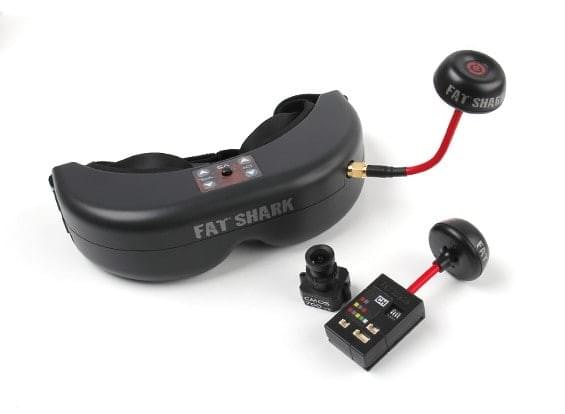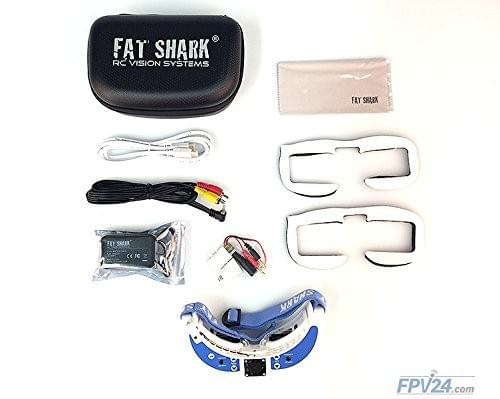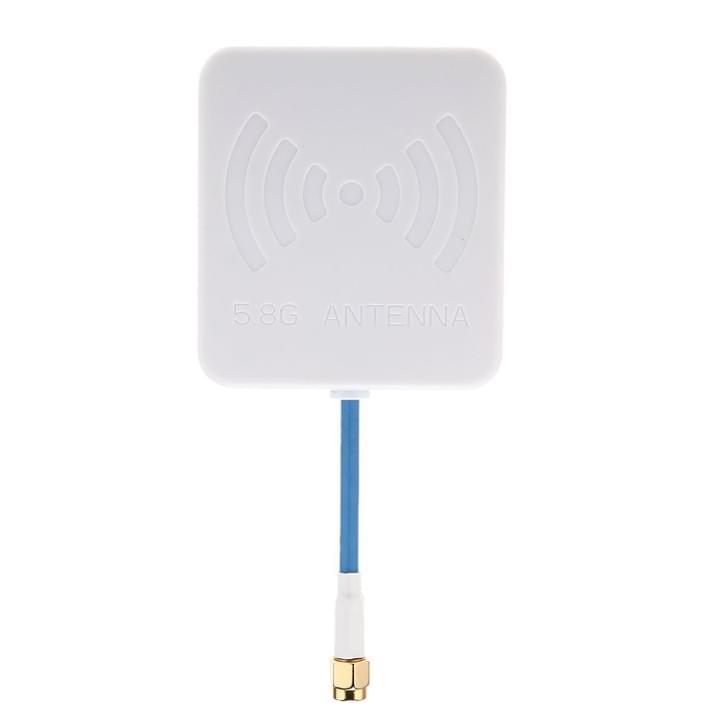

DIY Drones for the Evil Genius

Payload & FPV Reference Section
From lights to camera gimbals, you can learn about all of the different parts you need to add some capabilities to your drone (used throughout Sections 6 and 7).
Parts List

Landing Skids
Versatile Landing Gear
To make the most room for accessories, you need to slightly modify the drone’s frame. Right now, you don’t have much room to mount components under the drone—the clearance between the bottom plate of the frame and the ground is only about half an inch.
Luckily, there’s an easy way to add additional height. Quadcopter landing gear is fairly standard and comes in many varieties; the most common types are extended legs, landing skids, and retractable landing gear.

Light Switch
Transmitter controlled LED switch
A specific type of electronic switch is capable of turning on and off accessories (this can be anything from a camera shutter to an Spotlight LED).
The switch is a very simple circuit with a PWM cable and two wires. When the PWM cable receives a particular input, the two wires allow electricity to flow between them. When the cable doesn’t receive a signal, the flow of electricity is blocked. By default, the switch is off.

Spotlight LED
4 bright directional lights for your drone
The LED is very simple: it has two wires, just like the LEDs from the flashlight project earlier in the book. Remember, polarity odes matter on LEDs: it’s important to know which wire is positive and which is negative. Usually black is negative (ground), and red is positive. The LED you ordered is designed to run off of 12V, which is the battery’s output. Therefore, if you hook up the LED directly to the drone’s power distribution board or battery, it will turn on whenever the battery is plugged into a power source.
However, it’s way cooler to control the LED via your transmitter. Try integrating it with the switch above!

Camera Gimbal
Holds a camera steady while flying
Camera gimbals have been around for quite some time. You’ll find a lot of variety—from simple shock-absorbing structures and weighted supports to actively-controlled, multi-dimensional gimbals.
Mount a multi-dimensional gimbal to the quadcopter. In general, gimbals are simple devices: using onboard sensors, they counteract any motion to keep a camera steady and pointing in the same direction. In practice, they’re an advanced piece of technology capable of producing high quality cinematic footage. To keep the camera steady, gimbals use a combination of gyroscope/accelerometer sensors and brushless motors. The motors counteract the motion caused by the quadcopter and any outside forces like wind.

GoPro HERO5 Black Action Camera
The Gold Standard of action cameras
Once you have a gimbal mounted on your drone, you probably want to capture the best possible footage. GoPro makes the top-of-the-line action cameras and is light enough for a drone.

Tune Up: Bigger LiPo
4000mAh battery for longer flights
With top-of-the-line lithium polymer (LiPo) batteries, the drones can stay airborne for 10 to 30 minutes at a time. Since flight time is relatively short compared to other types of aircraft, operators tend to be very mindful of the weight the craft is carrying. The more weight, the more energy required to lift the aircraft and the less time the battery will last.
LiPo batteries typically power drones. These are extremely high-performance batteries that can deliver massive amounts of amperage very quickly. In basic terms, that means these batteries are able to quickly spin up the brushless motors to get your drone airborne! These are the same types of batteries used in electric cars like the Tesla Model S, X, and Three.
By getting a larger battery, your drone will stay airborne longer!

Tune Up: Banana Plugs
Make your drone more modular with these banana plugs. Instead of re-soldering wires, just plug them in. 3.5mm Gold Plated.
Plugs like these allow you to rapidly switch in and out components. Not that you would ever crash your drone, but if you did and need to rebuild, this will make the entire process significantly faster/easier.
Banana plugs are gold plated, which allows for a very high quality electrical connection.

Tune Up: Propellers
Made for speed
Now it’s time to attach bigger propellers. These new propellers have an adjustable shaft diameter.
By inserting different spacers, you can get them to work with a variety of motors. Test the right shaft diameter, install the propeller, and tighten the propeller nut.

Tune Up: 2300 KV Motors
Double the number of rotations per minute!
Previously, you were using 935KV motors. Remember, that means for every one volt of electricity, the motor spins 935 times per minute. The new motors spin 2300 times a minute, per volt! These new brushless motors spin over twice as quickly, which in turn generates significantly more thrust.
FPV Parts List
This list encompasses all the parts you need for a full First-Person-View (FPV) experience.

FPV All-in-One Kit
Includes receiver, goggles, transmitter, and camera.
FPV means the pilot wears goggles with a video screen so that he or she literally can see what the drone is seeing. These drones are different from your average consumer drone because they’re designed to fly much more quickly – around 80 miles per hour! They also lack consumer-friendly features like GPS sensors and aren’t built with a focus on design. But what they lack in features and aesthetics they make up for in power. Racing drones are a totally different beast compared to your typical consumer drone, and they’re much harder to fly.
Some kits contain everything you need, such as this Hobby King selection.

Enhanced FPV: Fatshark Goggles & Receiver
This upgraded goggle and receiver combination is top of the line.
Professional racing leagues all over the world attract thousands of fans and spectators. Corporations that are hoping to attract attention in the growing industry are even sponsoring these races. Races can take place both indoors and outdoors, and drones usually race on a track.
Professional racers use top of the line equipment, such as these items from FatShark.

Enhanced FPV: Receiver Antenna
These upgraded antennas will give you greater FPV range.
The transmitter uses the 5.8ghz band, which is standard for FPV systems. You can, however, upgrade the antenna. A selection of upgraded antennas is available on diydronebook.com. These antennas screw into the same coaxial cable port and can broadcast with increased range or directionality.
Find any mistakes in the book? Check out diydronebook.com/corrections
DIYDroneBook.com is an Amazon Affiliate and uses Amazon Affiliate Links for monetization purposes.
© 2017 DIY Drones for the Evil Genius (Cinnamon, Kadri, Tepper)












